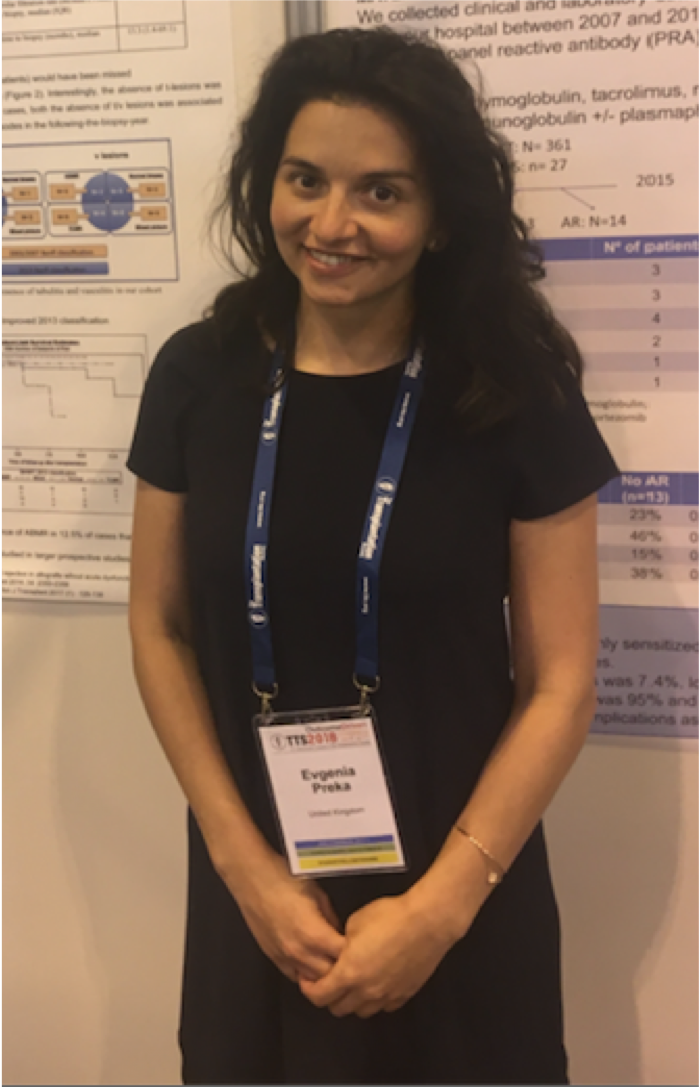
Post-doctoral scientist in PITOR, Paris, France
Pediatric Nephrologist in Necker-Enfants Malades, Paris, France
Unconventional immunotherapy in a case of pediatric EBV+ T-cell PTLD with concurrent EBV-associated smooth muscle tumor: A 14-year sustained remission
Evgenia Preka1,2, Marina Charbit1, Martin Castelle3, Richa Prakash1, Marina Avramescu1, Marion Rabant4, Dany Anglicheau5, Pierre Isnard4, Olivia Boyer1.
1Pediatric Nephrology, Necker-Enfants Malades Hospital, Paris, France; 2Paris Institute for Transplantation and Organ Regeneration (PITOR), Paris, France; 3Pediatric Hematology-Immunology Department , Necker-Enfants Malades Hospital, Paris, France; 4Department of Pathology, Necker Hospital, AP-HP, Paris, France; 5Department of Kidney and Metabolic Diseases, Transplantation and Clinical Immunology, Necker Hospital, AP-HP, Paris, France
Introduction: Post-transplant lymphoproliferative disorders (PTLDs) are among the most severe malignancies in pediatric solid organ transplant recipients. While the majority are EBV-driven B-cell neoplasms, EBV-positive T-cell PTLDs and EBV-associated smooth muscle tumors (EBV-SMTs) are individually rare. Their co-occurrence in a single patient is exceptionally uncommon and has not been previously reported.
Methods: We present a singular pediatric case of dual EBV-driven neoplasms—monomorphic T-cell PTLD and EBV-SMT—following kidney transplantation (KT). Diagnosis was established through histopathological, immunohistochemical, and molecular analyses of intestinal, marrow, and pulmonary tissues. EBV association was confirmed via EBER in situ hybridization. Clonality testing, STAT3 mutation analysis, and PET-CT imaging were performed to define disease extent. First-line treatment included immunosuppression reduction, rituximab, and a modified CHOP chemotherapy regimen as per guidelines.
Results: A 6.5-year-old EBV-naïve girl presented three years post-kidney transplant with acute abdomen and hemodynamic shock. Surgical exploration revealed ileocecal perforation. Histopathology identified CD3+/CD8+/EBER+ T-cell lymphoproliferation and a submucosal EBV-SMT. Bone marrow involvement and a STAT3 D661Y mutation were also confirmed. A PET scan demonstrated a single hypermetabolic digestive focus in the right iliac fossa without supradiaphragmatic or subdiaphragmatic nodal, hepatic, splenic, or osseous involvement. Despite aggressive first-line therapies disease persisted. Adoptive immunotherapy with three doses of third-party, EBV-specific cytotoxic T lymphocytes (5×10⁶ cells/kg/dose) led to complete clinical and metabolic remission within six weeks of the second infusion. EBV PCR normalized after two years and remains negative 14 years after treatment. The patient had an excellent allograft kidney function until the apparition of DSAs 8 years post-KT and antibody-mediated rejection (AMR). Despite currently requiring hemodialysis due to chronic active antibody-mediated rejection from longstanding poor adherence, the patient is undergoing re-evaluation for kidney retransplantation. The patient remains viremias-free. Fourteen years post-PTLD diagnosis, the patient remains EBV-PCR negative. Serial upper and lower endoscopies show no malignancy recurrence, aside from non-specific reactive colitis.
Conclusion: The coexistence of EBV+ T-cell PTLD and EBV-SMT is exceptionally rare, making our case a unique contribution to the field. EBV-specific CTL therapy demonstrated both a favourable safety profile and remarkable efficacy, leading to long-term remission. These promising results highlight the need for further investigations to refine the role of CTL therapy in refractory PTLD and improve outcomes in pediatric transplant recipients.
[1] PTLD post-kidney transplantation
[2] cytotoxic T lymphocytes (CTL)
[3] monomorphic T-cell PTLD
[4] EBV-associated smooth muscle tumors (EBV-SMTs)